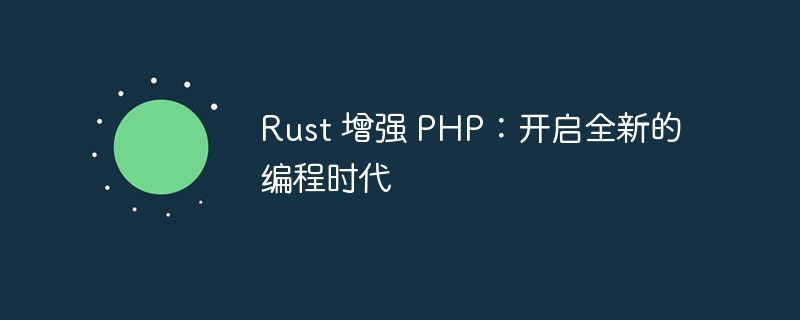Rust enhances PHP: opening a new era of programming

Rust enhances PHP: opening a new era of programming, requiring specific code examples
Introduction:
PHP is a very popular server-side scripting language, widely Applied to the field of Internet development. However, it has also been criticized for some features and security issues. At the same time, Rust is gradually emerging as a safe and efficient system-level programming language. This article will explore how to use Rust to enhance PHP and help readers better understand through some concrete code examples.
1. Understand Rust and PHP:
- Rust:
Rust is a system-level programming language developed by Mozilla. It is famous for its excellent security and efficiency. Widespread concern. Rust has the characteristics of memory safety and concurrency safety. Its ownership system can eliminate common memory errors (such as null pointers, data races, etc.) at compile time, thereby reducing the risk of program crashes and security vulnerabilities. - PHP:
As a simple and easy-to-learn scripting language, PHP has a wide range of applications in web development. However, PHP suffers from limitations and issues, including poor type safety, imperfect memory management, and inefficient operation.
2. Use Rust to enhance PHP:
- Develop PHP extensions:
Rust can easily interact with other programming language for integration. We can use Rust to develop PHP extensions to improve code execution efficiency and security. The following is a simple example that shows how to use Rust to write a PHP extension that calculates the Fibonacci sequence:
use std::os::raw::c_ulong;
#[no_mangle]
pub extern "C" fn fibonacci(n: c_ulong) -> c_ulong {
if n <= 1 {
return n;
}
let (mut a, mut b) = (0, 1);
for _ in 1..n {
let temp = a + b;
a = b;
b = temp;
}
return b;
}- Embedding Rust into a PHP project:
In addition to developing PHP As an extension, we can also embed Rust code into PHP projects to improve overall performance and security. The following is a simple example that demonstrates how to call embedded Rust functions in PHP:
$rustCode = '
#[no_mangle]
pub extern "C" fn add(a: i32, b: i32) -> i32 {
return a + b;
}
';
$dir = sys_get_temp_dir();
$rustFile = tempnam($dir, 'rust_');
file_put_contents($rustFile, $rustCode);
$extensionDir = ini_get('extension_dir');
$extensionFile = $extensionDir . '/rust_extension.so';
exec("rustc --crate-type cdylib -o $extensionFile $rustFile");
if (extension_loaded('rust_extension')) {
echo add(1, 2); // 输出3
}3. Summary:
Rust is a system-level programming with efficiency and security language, combined with PHP, can provide a more efficient and secure programming environment. Using Rust to develop PHP extensions or embedding Rust code into PHP projects can significantly improve the execution efficiency and security of your code. You can combine the advantages of Rust and PHP to make more interesting attempts and innovations based on actual needs.
The above is the detailed content of Rust enhances PHP: opening a new era of programming. For more information, please follow other related articles on the PHP Chinese website!

Hot AI Tools

Undresser.AI Undress
AI-powered app for creating realistic nude photos

AI Clothes Remover
Online AI tool for removing clothes from photos.

Undress AI Tool
Undress images for free

Clothoff.io
AI clothes remover

AI Hentai Generator
Generate AI Hentai for free.

Hot Article

Hot Tools

Notepad++7.3.1
Easy-to-use and free code editor

SublimeText3 Chinese version
Chinese version, very easy to use

Zend Studio 13.0.1
Powerful PHP integrated development environment

Dreamweaver CS6
Visual web development tools

SublimeText3 Mac version
God-level code editing software (SublimeText3)

Hot Topics
 CakePHP Project Configuration
Sep 10, 2024 pm 05:25 PM
CakePHP Project Configuration
Sep 10, 2024 pm 05:25 PM
In this chapter, we will understand the Environment Variables, General Configuration, Database Configuration and Email Configuration in CakePHP.
 PHP 8.4 Installation and Upgrade guide for Ubuntu and Debian
Dec 24, 2024 pm 04:42 PM
PHP 8.4 Installation and Upgrade guide for Ubuntu and Debian
Dec 24, 2024 pm 04:42 PM
PHP 8.4 brings several new features, security improvements, and performance improvements with healthy amounts of feature deprecations and removals. This guide explains how to install PHP 8.4 or upgrade to PHP 8.4 on Ubuntu, Debian, or their derivati
 CakePHP Date and Time
Sep 10, 2024 pm 05:27 PM
CakePHP Date and Time
Sep 10, 2024 pm 05:27 PM
To work with date and time in cakephp4, we are going to make use of the available FrozenTime class.
 CakePHP File upload
Sep 10, 2024 pm 05:27 PM
CakePHP File upload
Sep 10, 2024 pm 05:27 PM
To work on file upload we are going to use the form helper. Here, is an example for file upload.
 CakePHP Routing
Sep 10, 2024 pm 05:25 PM
CakePHP Routing
Sep 10, 2024 pm 05:25 PM
In this chapter, we are going to learn the following topics related to routing ?
 Discuss CakePHP
Sep 10, 2024 pm 05:28 PM
Discuss CakePHP
Sep 10, 2024 pm 05:28 PM
CakePHP is an open-source framework for PHP. It is intended to make developing, deploying and maintaining applications much easier. CakePHP is based on a MVC-like architecture that is both powerful and easy to grasp. Models, Views, and Controllers gu
 CakePHP Creating Validators
Sep 10, 2024 pm 05:26 PM
CakePHP Creating Validators
Sep 10, 2024 pm 05:26 PM
Validator can be created by adding the following two lines in the controller.
 CakePHP Working with Database
Sep 10, 2024 pm 05:25 PM
CakePHP Working with Database
Sep 10, 2024 pm 05:25 PM
Working with database in CakePHP is very easy. We will understand the CRUD (Create, Read, Update, Delete) operations in this chapter.






